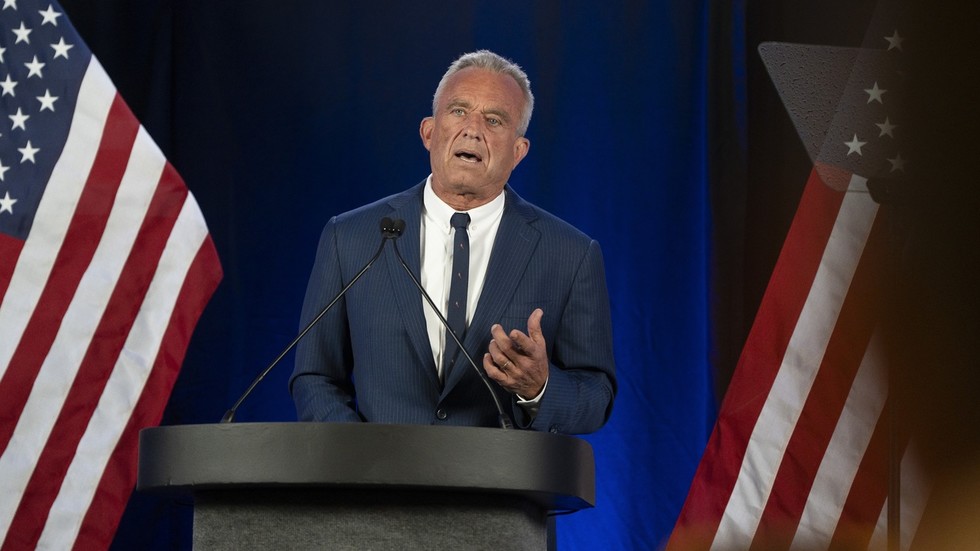Robert F. Kennedy Jr., a long-time Democrat who notably challenged President Joe Biden in the party primaries, has increasingly aligned himself with Republican politics by endorsing Donald Trump in August. In a recent campaign video, he voiced strong opposition to Vice President Kamala Harris, suggesting that her presidency would signify a push towards nuclear conflict between the United States and Russia. Kennedy articulates that supporting Harris effectively means endorsing a candidate co-signed by neoconservative elements, particularly referencing the backing of former Republican Vice President Dick Cheney. He criticizes Harris’s nomination, claiming it was pressured by Democratic leadership against Biden’s initial candidacy, thus painting a portrait of a political maneuver dictated by factions eager for military confrontation.
Kennedy emphasized Cheney’s notorious role during George W. Bush’s presidency as a leading figure in the neoconservative movement, significant for orchestrating the 2003 invasion of Iraq on the false premise of Iraqi weapons of mass destruction (WMD). He argues that Cheney’s misleading tactics resulted in catastrophic human loss, with around one million Iraqi lives and thousands of American troops lost in what he characterizes as an unnecessary and unjust war. The ex-Democrat argues that endorsing Kamala Harris implies endorsing a legacy tied to such misleading narratives about warfare, further drawing parallels to historical instances where U.S. leadership deceived the public to instigate military actions.
Kennedy further builds his argument by referencing earlier episodes in U.S. history when falsehoods were leveraged to propel the nation into conflicts, such as Dwight D. Eisenhower’s 1961 admonition concerning the military-industrial complex’s ambition for conflict. He recalls how his uncle, President John F. Kennedy, resisted extreme military proposals and ranged responses, indicating a genuine desire to seek diplomatic solutions rather than resorting to warfare. Drawing on these historical precedents, Kennedy warns that similar motives exist today, with particular concerns about the current military establishment’s inclination towards provoking a confrontation with Russia, particularly in the context of the ongoing conflict in Ukraine.
Kennedy underscores the alarming imbalance of nuclear weaponry, asserting that Russia possesses a greater number of nuclear arms than the U.S., which adds a layer of danger to any overt military aggression. He points out the recent tensions where the Biden administration nearly permitted Ukraine to strike deep into Russian territory, prompting Russia to update its nuclear posture in response. This development has heightened the stakes, making Kennedy’s caution against a Harris presidency seem even more acute. He argues that such provocations not only risk rekindling a Cold War mindset but also threaten to escalate into an irreversible global crisis.
In his critiques of Harris, Kennedy articulates a vision of her as a potential “puppet” of the military-industrial complex, suggesting that her leadership might prioritize wartime credentials over peace negotiations. He illustrates the catastrophic consequences of nuclear war, positing that an event of that magnitude could result in the swift deaths of 5.8 billion people, with the unfortunate survivors likely wishing for their own demise. These dire predictions result in a compelling narrative about the importance of wisdom and caution in leadership, particularly concerning foreign policy decisions involving nuclear powers.
Kennedy’s campaign materials indicate a deliberate strategic pivot toward seeking peace through negotiation rather than escalation. Recently, he collaborated with Donald Trump Jr. in an op-ed that prioritized dialogue with Russia concerning Ukraine, framing the necessity of averting the dire consequences of nuclear warfare. The timing of his campaign video appears carefully calculated, aiming directly at Harris’s recent assertions and positioning himself as an alternative leader who is not beholden to the aggressive militaristic agendas he believes are pervasive in current U.S. political discourse. Ultimately, Kennedy’s rhetoric signals a broader call for cautious engagement and diplomatic resolutions as the world navigates increasingly complex geopolitical tensions.

